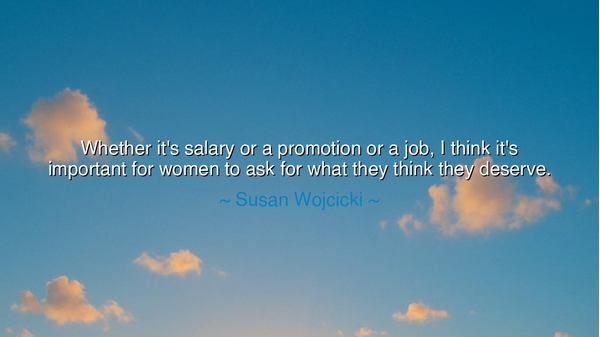
Whether it's salary or a promotion or a job, I think it's
Whether it's salary or a promotion or a job, I think it's important for women to ask for what they think they deserve.






When Susan Wojcicki declared, “Whether it’s salary or a promotion or a job, I think it’s important for women to ask for what they think they deserve,” she spoke as one who has walked the long road of labor and ambition. In her words lies an ancient truth: that the world rarely grants justice freely, but that one must rise and ask—with courage, with clarity, and with unshaken faith in one’s own worth. For too long, the voices of women have been softened by fear or silenced by custom, and thus their due has been denied.
Her teaching reminds us that salary, promotion, and jobs are not merely rewards, but measures of recognition—symbols of value in a world that too often diminishes the labor of women. To remain silent is to accept chains disguised as politeness; but to speak, to demand openly, is to break the spell of submission. The ancients taught that the tongue is a weapon sharper than any blade, and here the weapon is wielded not for destruction but for justice.
History bears witness to this struggle. In 1930, in Britain, women schoolteachers fought for equal pay alongside their male colleagues. They did not wait for favors; they demanded what was just, and though the battle was long, their courage shifted the tide. In America, too, women in the labor movement raised their voices in factories and fields, securing rights that silence would have forever denied them. Each act of asking was an act of defiance, a spark in the greater fire of equality.
And yet Wojcicki’s words also reveal the inner battle. To ask for what one deserves is not always easy; it demands self-belief in the face of doubt, persistence in the face of rejection. The world may frown upon the assertive woman, but the ancients remind us: “Fortune favors the bold.” It is not arrogance to claim one’s worth; it is wisdom. For only those who dare to speak can hope to be heard.
So let this teaching be carried forward: do not shrink from your value, nor leave it for others to define. When the time comes, raise your voice for the salary, the promotion, the job—for these are not gifts, but the rightful fruits of labor. Let every woman remember: to ask is not weakness, but power, and in that asking lies the seed of transformation for all who follow.






DCDiu Chu
Susan Wojcicki’s words encourage women to advocate for themselves, but I wonder how much societal expectations and gender biases influence the ability to do so. If women ask for a promotion or salary increase, they might face negative stereotypes about being ‘difficult.’ How can we overcome these barriers and encourage women to speak up for their value without fear of being judged? Is this something that should be actively taught or modeled more in workplaces?
NTNgoc Tran
This quote resonates deeply with me, but it also brings up the question of how women can navigate the fine line between confidence and being perceived as pushy. Do women face more resistance when they ask for what they deserve compared to their male counterparts? What can be done to ensure that women’s requests are heard and valued, without them having to fight extra hard for recognition of their worth?
KKKo ko
I agree with Susan Wojcicki—women should absolutely ask for what they deserve. But do you think women are sometimes punished for doing so, especially in environments where assertiveness is not always appreciated? Is there still a stigma around women being ‘too bold’ or ‘too demanding’ when asking for promotions or raises? How can workplaces create cultures that reward women for being proactive without making them feel like they’re overstepping?
VNVinh Nguyen
Susan Wojcicki’s statement is empowering, but it makes me wonder, why is it that women often feel the need to ‘ask’ for what they deserve when men are more likely to expect it? Is there a cultural or societal barrier that makes women hesitant to advocate for themselves in the workplace? How can we change the narrative so that women feel comfortable asserting their worth without fear of backlash or judgment?